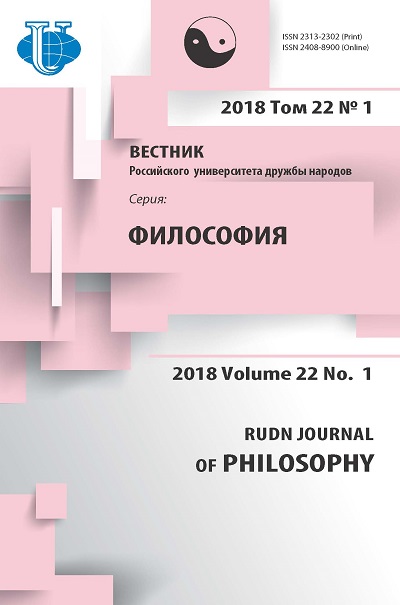The Specifics of the Problem of Subject in Receptive Aesthetics and Literary Anthropology of W. Iser
- Authors: Morozova MV1
-
Affiliations:
- National Research University Higher School of Economics
- Issue: Vol 22, No 1 (2018)
- Pages: 107-115
- Section: Scientific reports
- URL: https://journals.rudn.ru/philosophy/article/view/18147
- DOI: https://doi.org/10.22363/2313-2302-2018-22-1-107-115
Cite item
Full Text
Abstract
The paper attempts to investigate literary anthropology of W. Iser, created by him on the basis of receptive aesthetics. It is included a perspective of the historical and theoretical formation of Iser’s theory, as well as an actual point of view, related to the “anthropological turn” of humanities. There is an intention to demonstrate the philosophical value of Iser’s conception. It is emphasized the problem of subjective experience, the key features of which can be revealed through the study of the process of reading fiction. Iser defines his approach to the study of literature as functional, considering fiction as a medium in communication between text, reality and the reader. The focus of attention is on the transformations of subjectivity, involved through imagination in reading. Human presence, linked with a transcendental position, becomes apparent in the process of reading; however, it turns out to be connected with the essential uncertainty, the constant variability of subjective attitudes. Literature is explored as a medium of such an anthropological feature as human’s own inaccessibility for her|himself.
About the authors
M V Morozova
National Research University Higher School of Economics
Author for correspondence.
Email: seraffina7@gmail.com
аспирант Школы философии
101000, Russia, Moscow, 20 Myasnitskaya StreetReferences
- Kruglikov VA. Receptive aesthetics // Internet-versiya izdaniya: Novaya filosofskaya entsiklopediya. 2nd ed. Moscow: Mysl’; 2010. Available from: https://iphlib.ru/greenstone3/library/ collection/newphilenc/document/HASHd77bc0dc81b43e6e90ced7 (In Russ).
- Vdovina IS. Phenomenological and hermeneutical methodology of the analysis of works of art. In: Phenomenology of art. Moscow: IF RAN; 1996. p. 139—159. (In Russ).
- Gumbrecht HU. From Oedipal hermeneutics to philosophy of presence. Novoe literaturnoe obozrenie. 2005; 75(5): 34—43. (In Russ).
- Tagungsbericht: Die Forschungsgruppe „Poetik und Hermeneutik“. Erschließen — Historisieren — Aufgreifen. Ein Arbeitsgespräch, 29.11.2008 — 30.11.2008. Konstanz/Kreuzlingen CH, in: H-Soz-Kult, 16.04.2009. Available from: http://www.hsozkult.de/conferencereport/ id/tagungsberichte-2576.
- Iser W. Der Akt des Lesens: Theorie ästhetischer Wirkung. 4. Aufl. München: Fink; 1994.
- Iser W. The Reading Process: A Phenomenological Approach. In: Sovremennaya literaturnaya teoriya. Antologiya. Moscow: Flinta; Nauka; 2004. p. 201—225.
- Iser W. Prospecting: From Reader Response to Literary Anthropology. Baltimore: Johns Hopkins University Press; 1989.
- Schlaeger J. editor. The Anthropological Turn in Literary Studies. Yearbook of Research in English and American Literature (REAL). Vol. 12. Tübingen; 1996.
- Wulf C. Anthropology: History, Сulture, Philosophy. Saint Petersburg: Izd-vo SPbGU; 2008. (In Russ).
- Nicolosi R. the Anthropological turn in literary studies: notes from the German context. Novoe literaturnoe obozrenie. 2012; 113(1): 80—84. Available from: http://magazines.russ.ru/nlo/ 2012/113/ni16.html (In Russ).
- Günther H. Andrei Platonov sub specie anthropologiae. Novoe literaturnoe obozrenie. 2012; 113(1): 88—93. Available from: http://www.nlobooks.ru/node/1751 (In Russ).
- Dubin BV. Ocherki po sotsiologii kul’tury: Izbrannoe. Moscow: Novoe literaturnoe obozrenie; 2017. (In Russ).
- Ivanov V. Antropological turn: rehumanization of humanitarians? XIX Bannye chteniya. Novoe literaturnoe obozrenie. 2011; 111(5): 413—428. Available from: http://www.nlobooks.ru/ node/1037 (In Russ).
- Gumbrecht HU. Literaturnaya antropologiya vs nevozmozhnost’ ponyatiya chelovechnosti // Conference “XIX Bannye chteniya”; 2011 April 1—2; Moscow. Available from: http://www.nlobooks.ru/node/1314 (In Russ).
- Iser W. Fictionalizing: The Anthropological Dimension of Literary Fictions. New Literary History. 1990; 21(4): 939—955.
















